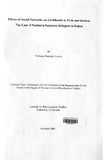| dc.description.abstract | Most studies about refugees in Africa often focus on the desperate circumstances that forced migrants find themselves in, and therefore often highlight the poor quality of and gaps in humanitarian assistance. Conventional findings therefore always emphasize vulnerability and dependence on aid, but hardly account for how refugees and returnees fulfil their unmet needs. This study identified diverse types of social networks of Southern Sudanese refugees and returnees and assessed how the resources accessed through them affect livelihoods in exile and upon return.
The findings reveal that refugees have innovatively established and utilized their local, regional and trans-national networks to cushion themselves from livelihood shocks, improve their living conditions, and develop their human and social capital for immediate and longer-term livelihood security. Based on these, the paper makes a case for evaluating, recognizing and supporting self-help groups, associations and initiatives among forced migrants as this is an empowering and sustainable strategy for addressing their short and long-term livelihood needs. | en_US |

